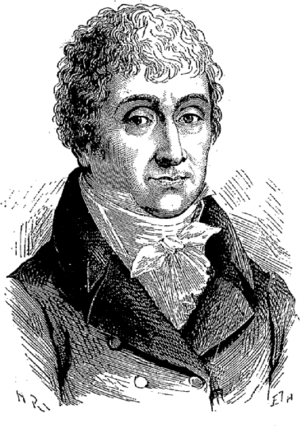Camille Jordan (politician) facts for kids
Camille Jordan was an important French politician who lived from 1771 to 1821. He was born in Lyon, France, into a wealthy merchant family.
Contents
Early Life and Exile
Camille Jordan grew up in Lyon and believed strongly in the idea of a king ruling France. During the French Revolution, he actively supported his hometown when it resisted the new government called the Convention. When Lyon was defeated in October 1793, Jordan had to flee.
He first went to Switzerland and then moved to England. While in England, he met other French people who were also in exile. He also met important British leaders. He really admired the way the English government worked, especially their constitution, which is a set of rules for how the country is governed.
Return to Politics
In 1796, Jordan returned to France. The next year, the people of Lyon chose him to be a representative in a special government group called the Council of the Five Hundred. He was known for his powerful speeches.
Jordan strongly supported true freedom, especially when it came to religious worship. He famously spoke up for the right to use church bells, which earned him the nickname "Jordan-Cloche" (Jordan-Bell). However, after a sudden change in government on September 4, 1797 (known as the coup d'état of 18 Fructidor), he was declared an enemy of the state and had to escape again, this time to Basel. From there, he traveled to Germany, where he even met the famous writer Goethe.
Life Under Napoleon
By 1800, Camille Jordan was back in France. In 1802, he bravely published a paper called Vrai sens du vote national pour le consulat à vie. In this paper, he openly criticized the ambitious plans of Bonaparte, who was becoming very powerful. Surprisingly, he was not harmed for this.
During Napoleon's rule, Jordan lived a quiet life in Lyon with his family. He spent his time writing for the Lyon academy. He wrote about how public speaking influenced the Revolution and how the Revolution influenced public speaking. He also wrote studies about the German poet Klopstock.
Later Political Career
When the king was brought back to power in France in 1814, Camille Jordan returned to public life. King Louis XVIII made him a nobleman and a state advisor. From 1816, he served in the Chamber of Deputies, which was like a parliament, representing the area of Ain.
At first, he supported the government. But when the government started to become too strict and traditional, he disagreed with them. He gradually became a leader of the group that supported a more balanced government with a constitution. His speeches in the Chamber were always powerful and well-spoken. Even though his health was failing, Camille Jordan continued his work until he passed away in Paris on May 19, 1821.
Writings
Camille Jordan wrote several important works, including:
- Lettre à M. Laniourette (1791)
- Histoire de la conversion d'une dame parisienne (1792)
- La Loi et la religion vengées (1792)
- Adresse à ses commettants sur la Révolution du 4 Septembre 1797 (1797)
- Sur les troubles de Lyon (1818)
- La Session de 1817 (1818)
His speeches were collected and published in 1818. Some of his selected writings and translations from German were published in a French magazine called L'Abeille française.
 | Bayard Rustin |
 | Jeannette Carter |
 | Jeremiah A. Brown |


